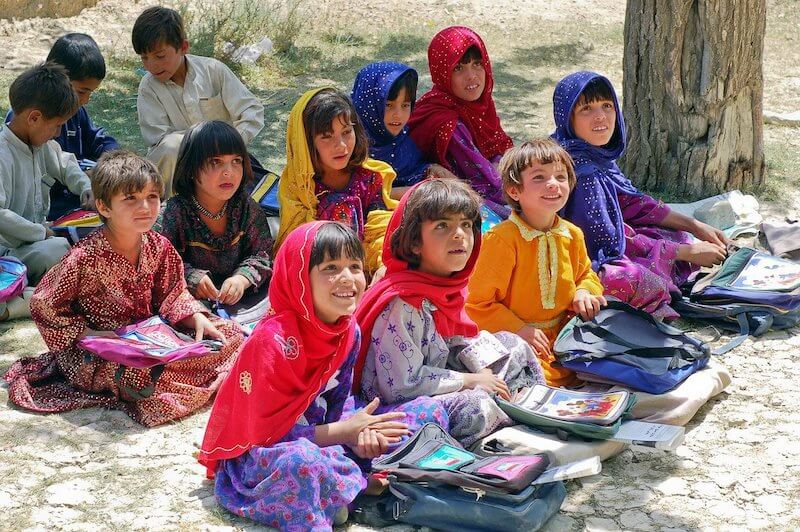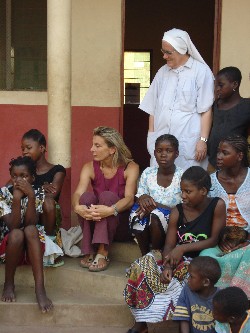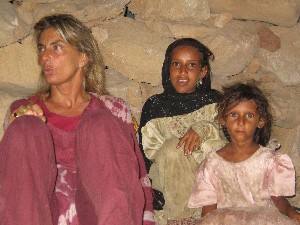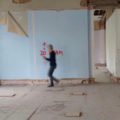
The expatriation of Susanna Fioretti is not an expatriation in the classic sense. On the contrary, her missions (by assignment of the Italian Red Cross or Italian Cooperation) last only three months as a maximum.
I met Susanna Fioretti through a book that my husband placed in my hands one day on returning from a work assignment in Rome. The book is entitled “Penelope’s Web”, and was printed in Kabul by an association of Afghan women.
I began to read with a mixture of scepticism and curiosity. Scepticism, because being myself rather accustomed to “difficult“ missions, and considering what my husband had told me about Susanna only working only in “difficult” countries, I was afraid of being faced with a document that would tell me nothing new.
Curiosity, because Susanna is a woman, and works in a context where women have to be doubly strong to obtain the same results as men; because she is Italian, and therefore unites us in a certain sense; because she is a mother, like myself, with two sons who stay in Rome whilst she goes away to sink in the sand, in the colours and in misery.
After I opened her book I could not put it down. With a naturalness matching Susanna’s style of communicating, I became involved in her story, in this life of hers made of elements and moments which characterise our lives, those of women, and something more, of an exposure to the unfamiliar, of a challenge, brave and obstinate, to different situations and rhythms for the need to survive, to sandstorms and torrential rains, to secular cultures, to spectacular dusks and to poverty, difficulties, injustices, the struggle for survival…
Susanna Fioretti has worked and continues to do brief missions in Afghanistan, India, Mauritania, Iran, Yemen and Mozambique, countries that she recounts with honesty, respect and disillusionment. Mixing together missions which take her to remote corners, private moments borne of affectionate disillusionment, of new relationships made, of new adventures starting, of a “sentiment” totally feminine, totally maternal, totally and profoundly sincere.
I had the good fortune to be able to talk quickly with Susanna Fioretti between a return from Mauritania and a departure for Kabul. What follows is our chat on Skype.
I liked your book very much; in particular, the magic with which you have inserted personal questions of your own in with your humanitarian missions. I think the success of the book is down to this. It feels as if you talk not as a missionary, nor someone from the Red Cross, but above all and substantially, as a woman who carries with her, her own pains, her own fears, and the desire and unbridled happiness of life. It is evident that you have a not too well-hidden disposition as a writer. Have you written any other books besides Penelope’s Web?
My first book, “Fragments of a Roman Story”, tells my experience as volunteer nurse in a nomad camp on the edge of Rome, which is my own city. Afterwards, I wrote stories for children, but because of various editorial issues, they were not published, then finally, Penelope’s Web.
In effect what you say is true; the risk of writing about humanitarian missions in Third World countries is that one imagines it to be the story of a kind of lay nun, and the fact of introducing loves, divorce, sons etc in the middle of it turned it into another thing, I think finding more common ground with readers.
This is what many people told me after they had read it. It was a lovely sensation to discover what I had started as a personal release had generated interest and even hope in unknown men and women
You have worked in various countries. Can I ask you which out of all of them has affected you most in your heart?
I started with Mauritania, followed later by India and afterwards Afghanistan, since 2002, with a spell in Iran, always short missions, no more than three months. I also worked in Yemen and, since last year, in Mozambique. The country I have fallen in love with the most? Mauritania, but also Afghanistan (which I talk about in a second book who knows when I will finish that)…. One does not always fall in love with the most difficult?
But also, you must love Greece dearly, since you have decided to throw yourself into an eco-house project (Susanna Fioretti is the creator and coordinator of an investigation into environmental protection on Rhodes, where she has designed and built an eco-house, which incorporates interesting natural ideas and activities, and some dreams…). Where are you now with this adventure, and how do you manage between missions abroad and personal obligations?
Of all the activities I’ve started, the house is the only one that is currently stalled, and that with great financial effort on my part. One year after finishing the roof, it was leaking, water was seeping between the straw walls and… I prefer not to think about it.
 It took two years at my speed to repair all the damage and I always have a heap of costs to keep it going. I wanted to move there with adopted children, after a certain period of time. Later I stayed there alone and tried to rent it to cover the costs, but also offered some organisations to house orphaned or vulnerable children there.
It took two years at my speed to repair all the damage and I always have a heap of costs to keep it going. I wanted to move there with adopted children, after a certain period of time. Later I stayed there alone and tried to rent it to cover the costs, but also offered some organisations to house orphaned or vulnerable children there.
One summer, I had Greek orphaned children as guests, and it was lovely for everyone. I wanted to repeat the experience with HIV positive children or those affected by AIDS, but the people in the neighbouring town did not like the idea. In order to put these activities into action, one has to have the time to follow them up and lately I have been too busy to find contacts or contributions. But next July the children will finally return, assisted by a Belgian association. What is certain is that in order to be able to continue, I must slow up, and find some way to produce enough to cover the costs of maintenance.
Returning to your missions in Islamic countries, there is a question I wanted to ask you. In general talking with Moslem women we find ourselves faced with two currents: those which stress the exploitation, the humiliation, the degrading conditions to which the woman is subjected, and the other, in total contrast, which affirms that all the bad things attributed to the lives of Moslem women are another thing that results from the western disinformation with respect to how Moslem women really feel in an Islamic contexts. In your opinion, is it possible to take apart these two images to create a synthesis?
It is very difficult to generalise, because the type of life of the Moslem woman depends so much on the country and the social extraction. Islam is not the same everywhere, there is an Islam which can be compared to fanatical Catholicism, those who burn women at the stake, then there is an enlightened Islam, progressive, and there are also situations in between. It depends a lot also on the social conditions.
For women in lower social sectors, their rights are much more limited if not non-existent. But this is not true for example in Mauritania, where many women from whatever background have the opportunity to work and be independent.
In all cases there is the constant of the Koran, and I am not only referring to the “Sura” of the women, that marks the role of the woman as subordinate to that of the man, in various senses.
In Islam social life is regulated by the Sharia and by tradition, and by how much one can be free between domestic walls where outside one must live according to the rules, burqa and whatever else.
It depends also on how much the husband, father or brother have studied and/or travelled. In general, the more the men have been exposed to other cultural experiences, the freer the women, and it is rare that in certain higher social circles, the men have various women simultaneously, at least in some countries.
Perhaps, it is best to avoid generalisations. And although it is normal to judge from one’s own perspective, it is important to broaden it and take into consideration “the other point of view.”
A small example: I worked on the island of Socotra, in Yemen, it was May and there was a heat-wave, I had to wear a long-sleeved shirt and a skirt to my ankles; although they were light cotton, I was sweating constantly.
I was looking surprised at the Yemeni girl who was my translator, or should I say her eyes, as they were all I could see, given that she was wearing a real burqa, black, with a veil, socks, shoes and gloves, always black, and beneath a long dress, all in synthetic material!!! I felt sorry for her and at one point I asked her how she could stand it.
She, totally astonished, replied that she would neither have been able to or wanted to wear anything else, and since I was on the subject she added that she did not like how I dressed or even worse the tourists who came to the island.
Dressed in the way she was creates many skin problems because of the sweat and the lack of exposure to air and light, and it seems absurd that no woman on Socotra can bathe without clothes in the beautiful sea… but however much people like me see it as a punitive and sacrificial garment, for her it was the good and just thing to wear.
I would like to conclude with mention of your sons, and a maternal discussion. Expatriates “like me”, who live for large periods of time in various countries, come to a certain point in which the kids, once they’ve grown, leave the nest to go to study in another country. It is very rare that the children go to university in the country their parents are living in at that particular moment. For you the discussion was reversed… and it has been that at a certain point you have thrown yourself into work that has taken you abroad and you flew the coop, leaving your sons and your home… how have you lived through this?
When I separated from the father of my sons, we had agreed that the children, then still small boys, would have to stay with me until the elder reached 20 years old and the younger 18 years old. Later they were to move to be closer to him.
In reality, this is how it has turned out, and it was convenient that his move coincided with my separation from the second and last man with whom I shared a long and important relationship.
I happened then, more or less contemporaneously, to live with three men and a dog, and remain only with the dog. Although she did the best she could (she was a girl) I must say that I felt the emptiness.
It really wasn’t a good time, and what I said to the boys, and to myself was that it was necessary to choose between a depressed, psychopath ever-present mother in the home, and one who, trying to forget and become useful in countries where there were very different problems, might perhaps become normal again.
In this mindset, I left for the first time as a volunteer and began to do this kind of work, imposing a rule on myself: to accept only brief missions, no more than two or three months, to be able to return straight home and be with “my boys” and merely through the mail, one cannot do it: to meet with them, to eat together, to see them change, to talk with them, listen to them…
Together with the promise to drop everything and return immediately in case they needed me, this was my way of being a “Working mother abroad”, and it is much easier now that they are 28 and 26 respectively. It cost me in terms of earnings and my career, for them I do not know how hard it has been because they never seem to have regretted having a mother similar to themselves. And in spite of everything, I think that we have managed to maintain a good and strong relationship.
I would like to conclude this interview with passages taken from the introduction and appendix of the book of Susanna Fioretti, which I hope we can see again on the shelves.
“[…] In recent years I have kept an inconstant diary, in which there is little or nothing of certain thoughts and deeds, and many of others. It is an incomplete chronicle, but truthful; pages which I now put together without modifications or additions in order that what I omitted, and what on the other hand I found necessary to put down on paper, can help me to understand how I am made and what things for me are truly important.
I have realised that my life seems in this way very similar to the web of Penelope: woven from the light of reason and emotion, undone in moments of obscurity… but I am not Penelope. It is not a distant husband for whom I wait and have faith in, and although I see myself controlling the plot, it is not always me who adjusts or unravels the knots.
In effect, rather than sitting at the loom, I am on a swing. I fly high, I see far, and then I return to earth to find the hard ground beneath my feet.
Evanescent camel caravans, canoes at the mercy of the waves, metal jugs on bejewelled heads, women who collect cotton with bloodied hands, women dressed in coloured embroidery digging ground as hard as stone, women with veils cutting up firewood, desperate eyes, happy and curious eyes, immense eyes on tiny faces, columns of a temple which dominate the sea, the domes of Rome in a blue sky, fresh fields to rouse the horse to a gallop, expanses of broom, mosaics of jungle flowers, braids of stone, closed gates on centuries of history, sandstorms, the howl of the jackal, the teeth-marks of fear, red dunes and giant nomad tents, nights of kisses taken suddenly by surprise by the dawn, endless nights, armed men, toothless men, skinny adolescents dragging enormous bundles, young boys with already withered skin, the white sun that kills, the hunger, the dryness, the disease, lost corpses, mutilated corpses, disintegrated villages, praying for and believing in an answer, the return home, hearts that beat one next to another, shouts of happiness and a hot grimace, to fall asleep in safety in the old bed, the nocturnal song of the owl and that of the morning blackbird, the light of autumn, snowflakes on the dark car of the woods, the smoke of incense and prayers, pagan festivals, dances as light as flight, obsessive tribal dances, organ music in an empty church, Night Songs of Rachmaninov, the smell of grilled meat, chestnuts and newly washed clothes, donkeys with backs broken from fatigue, majestic palms and ancient cities besieged by sand, infinite horizons of immense solitude, laughter that rescues one from pain, beggars dressed in rags, symphonies of cigars, perfume of liquorice and jungle sage, waves of silver and turtles beneath the moon, to love and to feel endlessly, to lose love and reason, expanses of rubbish, columns of suffocating smoke and infected air, my sons who smile in their sleep, my sons transformed into men capable of love, enslaved children, children who have not known caresses, children who live in terror, children who are hungry, children who suffer and die without tears, to feel useless, to surrender, to cling to a hope, to taste a fierce nostalgia, to fall ill where a hospital is further away than a mirage, hair plastered with dust, skin cracked by dehydration, lukewarm water to drink, goats with which to share a stable for the night, meals eaten on knees with ten hands in the same miserable plates, silver coverings on lace tablecloths, mountains of food for saturated stomachs, traffic lights and telephones ringing, too much silence, a city where the sky goes on forever and darkness does not exist, black skies sprinkled with stars and crystals, the song of the muezzin and sounds of the bells, Diwali, Ramadan, Christmas, to feel at home everywhere and nowhere.
From this the tapestry of my life is woven: an intertwining of separate and distinct threads apparently without theme, but that nevertheless, for me, begin to finally compose a picture. At times it is still the air of spring, and I live in dreams, tremors and projects, at times on the other hand, I think I know what the web is all about and how it should end, and I see myself at the gates of autumn and of wisdom. I have the sensation of having two bodies, one florid, strong, reliable, the other tired, scarred and treacherous, that take their turns like a wandering soul, alternating with each other searching for stillness. I feel, in two words, like an old girl. ”







